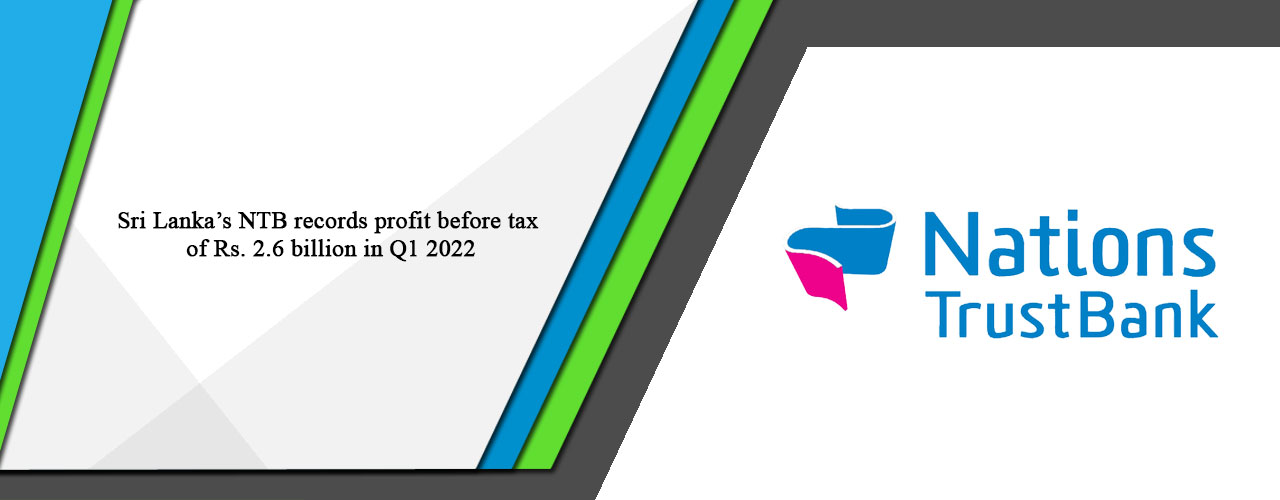Sri Lanka’s NTB records profit before tax of Rs. 2.6 billion in Q1 2022
The Morning: Nations Trust Bank PLC (NTB) stated it has reiterated a strong financial position with steady growth in the first quarter (Q1) of the financial year ending 31 March 2022, posting a 4% year-on-year (YoY) increase in profit before tax (PBT) to Rs. 2.6 billion, amidst challenging local and global macroeconomic conditions.
Commenting on the Q1 2022 results, Director/CEO Hemantha Gunetilleke stated: “During this quarter, NTB continued to focus on our core banking operations and risk management while serving customers through our strong franchise in consumer, commercial, and corporate banking. By staying focused on our core values built around service excellence and prudent banking practices, we have built on the bank’s financial strength and stability despite headwinds in the national economy.
“The bank’s Tier I capital and total capital adequacy ratios as at 31 March 2022 were satisfactorily above regulatory levels at 11.8% and 14.1%, respectively. Supported by this strong capital base, along with healthy liquidity buffers and the robust risk management models, we, as a bank, are confident and equipped to withstand any potential impact caused by further macroeconomic challenges.”
Operating income grew by 32% in comparison to the same period last year, with a net interest income growth of 46% and fee income growth of 21%. The loan book expanded by 12% while the current account savings account (CASA) ratio increased to 42% compared to 36% last year.
With a stringent cost management culture in place across the bank, despite the inflationary conditions in the economy, total operating expenses grew by only 2% YoY, highlighting the positive impact of efficiency models adopted across the bank.
The bank reported an increase in impairment provisions by 112% on loans and advances. Contributing to this YoY increase was the negative flows from some moratorium loans during the current year. An additional impairment of Rs. 990 million on account of investments in Sri Lanka government securities denominated in foreign currency was also made considering the current economic environment. This investment portfolio stood at only 3.6% of the bank’s assets as at the end of 31 March 2021.
Overall tax expense increased during the reporting period owing to the increase in the rate of value added tax (VAT) on financial services and the income tax reversal related to the financial year 2020 which is accounted for in 2021. As a result, the profit after tax declined by 12% during the first quarter of 2022. The bank’s return on equity stands at 16.64% this quarter.
“Looking into the future, we will remain focussed on supporting the banking needs of our customers, despite the challenging operating environment while also building on our strategic focus on environmental, social, and governance (ESG) objectives,” Gunetilleke stated.
OSL take:
Sri Lanka’s economy has shown great resilience to external and internal challenges through the years and is once again on the path to recovery after facing the pandemic challenges. With Sri Lanka working towards becoming a business destination in the South Asian region assisted by the development agenda, a strong banking system a pre-requisite for Sri Lanka’s expanding economy. The impressive growth and profits recorded by Sri Lanka’s banks is indicative of the strength of the banking system as well as the overall business potential in the country. Given Sri Lanka’s geographical positioning in the Indian Ocean and the many trade agreements enjoyed by the country, the expanding opportunities in Sri Lanka pose lucrative business/investment opportunities.
| Article Code : | VBS/AT/25052022/Z_6 |

